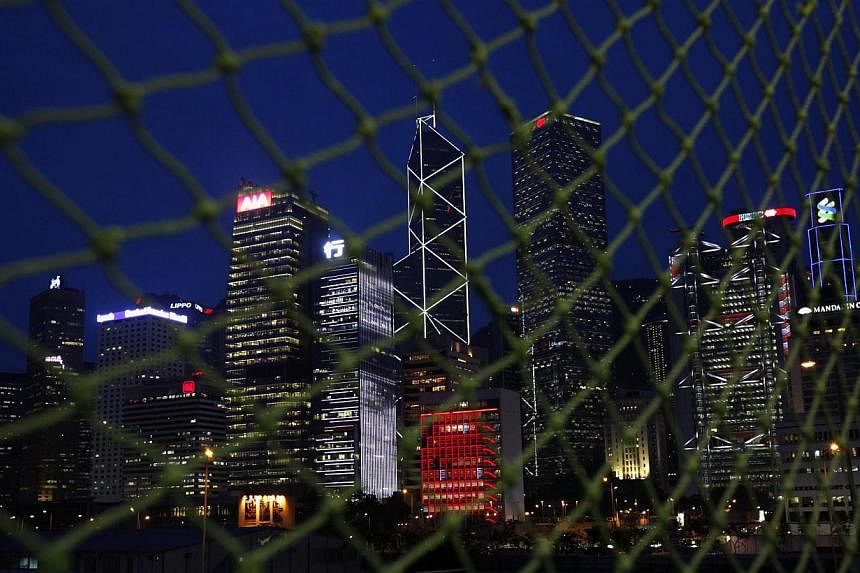HONG KONG (Reuters) - Multinational companies and financial institutions in Hong Kong are drawing up emergency plans in the event of a partial shutdown of the financial hub's business district this summer due to a planned pro-democracy protest.
Activists have threatened to lock down the Central area of Hong Kong, home to some of Asia's biggest companies and banks, as part of a campaign for the right to choose candidates for a poll in 2017 to elect Hong Kong's next leader.
Democracy protests over the past year have stoked friction and unnerved Beijing leaders fearful of an opposition democrat taking the city's highest office.
Concerns about growing discontent and the threatened closure of city's business district by the so-called Occupy Central activists have prompted companies and financial authorities to prepare for the worst.
Protest organisers hope to draw tens of thousands to their movement, but no date or specifics have yet been announced on their action. The protest could start as early as July 1.
The Hong Kong Monetary Authority (HKMA), the de facto central bank, said it would carry out a "business continuity planning drill" shortly with member banks to "protect the critical areas of their business and to cope with disruptions".
Ms Rhonda Lam, a spokesman for the HKMA, declined to confirm how many banks were involved or whether the drill was directly related to Occupy Central, but said it would address the"inaccessibility of banks' headquarters or offices due to any possible events that may happen in Central".
The thorny issue of political reforms has continued to dog the former British colony that reverted to Chinese rule in 1997 amid promises to grant the free-wheeling capitalist hub broad-ranging autonomy, pitting a feisty opposition pro-democracy movement against Beijing's conservative Communist Party leaders.
On Tuesday, China published a report warning Hong Kong that there were limits to its freedom and it should adhere strictly to the law, in what was seen as a veiled threat.
The Occupy Central organisers have stressed, however, that their civil disobedience movement is "non-violent" and motivated largely by China's refusal to allow a truly fair election in 2017 that would include opposition democrats.
Hong Kong's incumbent pro-Beijing leader Leung Chun Ying has warned such a protest would be illegal and will not be tolerated.
Protesters have demanded full democracy in 2017, with a key condition being the open nominations of candidates so that anyone, including China critics, can run for office.
But Beijing has rejected that, citing the city's mini-constitution that states all nominees must be endorsed by a 1,200-strong election committee, which is stacked with Beijing loyalists.
The head of property-to-retail conglomerate Wharf Holdings, Mr Peter Woo, as well as Hong Kong's second-wealthiest person, property mogul Lee Shau Kee of Henderson Land, have cautioned that any paralysis of the main business hub would damage the city's reputation.
The Hong Kong Bankers Club, whose members include most of the city's major banks, said it would have a contingency plan in place before July 1. The private club, along with other tenants including Italian luxury fashion group Prada and auditor PricewaterhouseCoopers, have been advised by landlord Hongkong Land Holdings to be prepared for trouble.
New World Development Company Ltd, another major landlord in Central, also has in place "contingency measures to ensure that its critical operation is maintained and that disruption to its normal business is kept at a minimum".
Across the street at the headquarters of HSBC , the bank has begun to "stress-test" its systems capability for staff to work from home.
It sent an e-mail to staff urging as many people as possible to work away from the office during a weekend to prepare for the eventuality that the headquarters might be blockaded, said a senior banker who declined to be named as he was not authorised to speak to the media.
"It is possible that protests and marches will occur in Central on 1 July 2014 and that, depending on the situation, HSBC Main Building and its operations may be impacted in the following days," according to an internal e-mail seen by Reuters.
The potential impact on the Hong Kong stock exchange, Hong Kong Exchanges and Clearing, on the harbourfront fringe of Central, would be minimal even if the protests spread to its doors, with 0.16 per cent of turnover carried out on the actual trading floor, a spokesperson for HKEx said.

